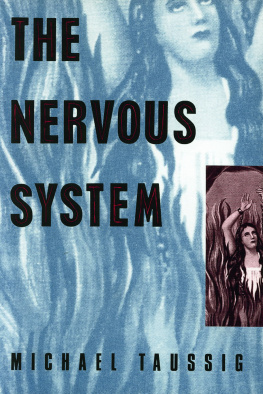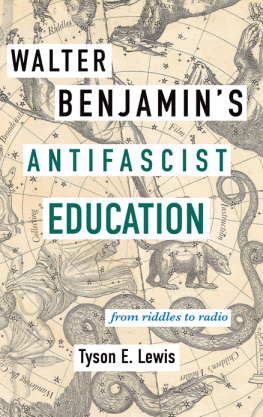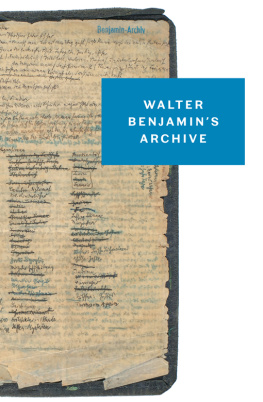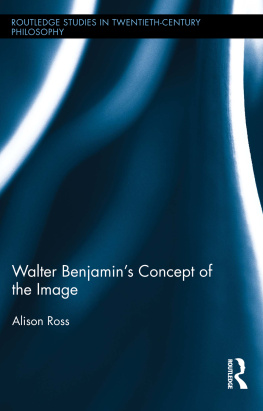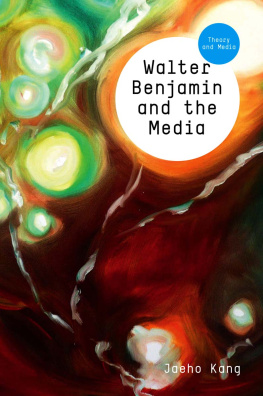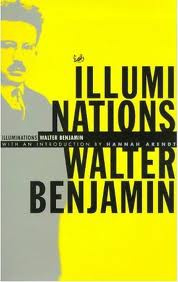MICHAEL TAUSSIG is professor of anthropology at Columbia University. He is the author of nine books, including Shamanism, Colonialism, and the Wild Man; Law in a Lawless Land; and My Cocaine Museum, all published by the University of Chicago Press.
The University of Chicago Press, Chicago 60637
The University of Chicago Press, Ltd., London
2006 by The University of Chicago
All rights reserved. Published 2006
Printed in the United States of America
15 14 13 12 11 10 09 08 07 06 1 2 3 4 5
ISBN: 0-226-79003-7 (cloth)
ISBN: 0-226-79004-5 (paper)
ISBN: 978-0-226-79000-8 (e-book)
Library of Congress Cataloging-in-Publication Data
Taussig, Michael T.
Walter Benjamins Grave / Michael Taussig
p. cm.
Includes bibliographical references.
ISBN 0-226-79003-7 (cloth : alk. paper) ISBN 0-226-79004-5 (pbk. : alk. paper) 1. AnthropologyField work. I. Title.
GN34.3.F53T38 2006
301.0723dc22
2006007289

The paper used in this publication meets the minimum requirements of the American National Standard for Information SciencesPermanence of Paper for Printed Library Materials, ANSI Z39.48-1992.
Authors Note
Looking back at these essays written over the past decade I think what they share is a love of muted and even defective storytelling as a form of analysis. Strange love indeed; love of the wound, love of the last gasp, as comes on strong in the lead essay, Walter Benjamins Grave, where I try to let the landscape overwhelm history such that the tragedy lies bare and the words, seeking some sort of redemption, fall aside. If I cant have my stories, then at least there has to be a swerve in the writing itself because the writing is the theory and the swerve is what trips up thought in a serpentine world. They also share a love of anthropological field-work, a love of the classical anthropology of so-called primitive societies, and an intense curiosity as to the displacement of Marx and Freud by Nietzsche and Bataille that such old-fashioned anthropology provokes.
Thematically there is great variation; from the graveyard at Port Bou where Walter Benjamin was buried on the Spanish frontier with France, to discussions of peasant poetry in Colombia, the pact with the devil, the disappearance of the sea, the peculiarities of the shamans body, transgression, the New York City police, and the relationship between flowers and violence.
Half the essays have been rewritten for this book and only in that process did I become aware of how much I had wanted to write from within instead of standing outside pointing. This is not so much autobiography or what is sometimes called self-reflexiveness, though there is plenty of that and necessarily so because the anthropologist is inevitably part of the reality analyzed. It is more like having the reality depicted turn back on the writing, rather than on the writer, and ask for a fair shake. What have you learned? the reality asks of the writing. What remains as an excess that cant be assimilated and what are you going to do with the gift I bestow, I who am such strange stuff?
One way of highlighting this is to lay bare what goes on in anthropological fieldwork as a prolonged encounter with others fraught with misunderstandings that actually open up the world more than do understandings. I try to depict this in my essay Constructing America, which concerns a peasant poet in Colombia who, in reciting his epic verses, shatters all accepted frames of historical and social analysis that I can think of. In the give-and-take there with the anthropologist, the reader can see how precarious and unstable the whole enterprise of interpretation actually is and how this instability of meaning actually thickens meaning, a result enlivened by the peculiar fiction that frames the essay, estranging the entire encounter. The scene is set by the complete disappearance of the anthropologist. It is as if he had died. What is left is a bunch of notes and audiotapes in an archive in a faraway country, which some well-intentioned researchers stumble across and, with the aid of the wise director of the archive, proceed to analyze with an engaging mix of bewilderment and keen insight.
Bataille would have called this sovereignty, meaning the mastery of nonmastery, and in this he followed Nietzsche who complained that we dont think sufficiently about the fact that when we explain the unknown we reduce it too quickly to the known. That is the first problem. We strip the unknown of all that is strange. We show it whos boss, the basic rule of a university seminar. We tolerate neither ambiguity nor that which wont conform. The second and even greater misfortune here is that we thereby forget how strange is the known. This is why I have sought not for masterful explanations but for estrangement, the gift of ethnography no less than of literature.
Along with mimesis and secrecy, transgression was an issue that greatly interested me at the time I was writing these essays. Transgression came to me by way of Bataille who got it from Nietzsche, and it appealed to me as a way of reacting tonot explainingthe presencenot the roleof the Christian devil as a peasant image of large-scale capitalist enterprise, awesomely scaled and no less awesomely endowed with the ability to destroy life as well as bestow riches. This is set forth in The Sun Gives without Receiving, a title I took from Batailles Accursed Sharethe accursed share being what is offered in sacrifice.
Sacri fice, pronounced Bataille, consecrates that which it destroys. There is holiness in crossing the threshold no less than in breaking the taboo, and the holy, lest we forget, is as likely to be left-handed as not. All rites know this and are built on it. The old anthropology of primitive societies as much as the texts from ancient history and todays commissions of inquiry into police corruption offer a goldmine of extraordinary examples. This is what the essay Transgression sets out to demonstrate, not merely as an essential part of human and social life but one with consequences for the way we think about thinking. This is further elaborated in The Language of Flowers, concerned with connections between cartoons, flowers, and mutilation of corpses.
In this I merely follow the pioneering example of Batailles College of Sociology that held meetings in Paris between 1937 and 1939. Drawing upon the ethnography of primitive societies, Nietzsche, and Freud, the college defined its subject as that of sacred sociology aimed at understanding modernity as terror fell over Europe. Today the terms seem no less relevant to the United States. We could certainly do with some sacred sociology right now.
Nietzsche said the devil was Christianitys appropriation of that stranger god, Dionysus, spirit of ecstasy and intoxication, mimicry and dance, unproductive expenditure and too muchnessthe point being that some things, the important things in a human life and history, are motivated not only by rules but by the need to break them.
Such an approach is likely to create problems for those of us who yearn to master the unknown through logical explanations of the sort that Platos puppet known as Socrates set forth. Would that reality could be assimilated to those harmoniesof pure thoughtand was not like that famous river into which you can never step twice. To step into the river means to immerse oneself in the beingness of the world, which is messy, as well as ride the incandescent wave of instability and contradiction whereby the rule is both followed and broken, which is even messier.

 The paper used in this publication meets the minimum requirements of the American National Standard for Information SciencesPermanence of Paper for Printed Library Materials, ANSI Z39.48-1992.
The paper used in this publication meets the minimum requirements of the American National Standard for Information SciencesPermanence of Paper for Printed Library Materials, ANSI Z39.48-1992.
